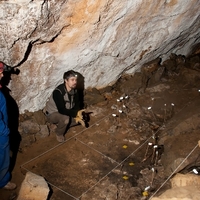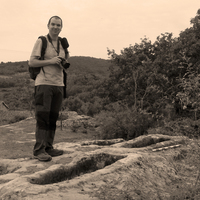
Pedro J Oiarzabal
Pedro J. Oiarzabal was born and raised in Bilbao and has spent much of his life between the Basque Country, Ireland and the United States. He holds a PhD in Basque Studies-Political Science from the University of Nevada, Reno, a MPhil in Economics and Social Sciences from Queen's University of Belfast (N. Ireland), and BA in History from the University of Deusto (Bilbao). He is the Director of Social Innovation Research at Arima Social Lab. For nine years he had been a PhD Researcher on Migration Studies at the Human Rights Institute, University of Deusto, and also the Jon Bilbao Research Fellow on the Basque Diaspora, 2014-2016, at the University of Nevada, Reno. His research examines diaspora and migrant communities interaction with information and communication technologies, with particular emphasis on the Basque case. He also specializes in Oral History, Memory Studies (social and historical memory), and Digital Humanities. Among his publications are "La Identidad Vasca en el Mundo" (2005), "A Candle in the Night: Basque Studies at the University of Nevada, 1967-2007" (2007), "Gardeners of Identity: Basques in the San Francisco Bay Area" (2009), "Diasporas in the New Media Age: Identity, Politics, and Community" (2010), "Knowledge Communities" (2011), "Migration and the Internet: Social Networking and Diasporas" (JEMS, Vol. 38, No. 9, 2012), the oral history video "Fragments of Our Lives" (2013, http://youtu.be/F_Dusb26nhA), and "The Basque Diaspora Webscape: Identity, Nation, and Homeland, 1990s-2010s" (2013).
ORCid: http://orcid.org/0000-0001-7242-4599
ORCid: http://orcid.org/0000-0001-7242-4599
less
Related Authors
david mota
Universidad de Valladolid
Fernando Martínez Rueda
University of the Basque Country, Euskal Herriko Unibertsitatea
Marina Segovia Vara
Universidad Complutense de Madrid
InterestsView All (34)









Uploads
Book chapters by Pedro J Oiarzabal
Within the theoretical frameworks of international relations and diaspora studies, this study is rooted in local cultural practices from which the data are extracted, relying on in-depth interviews of Basque policy makers and diaspora institutional leaders as well as ethnographic research and participant observation in diaspora events and activities.
This chapter highlights the influence of non-state homeland governments on their diaspora populations and social organizations, particularly the destabilizing consequences of homeland political parties on the diaspora, in attempts to (re)construct their cultural hegemony. The diaspora becomes a desired lost object that validates alternative homeland ideologies.
Books by Pedro J Oiarzabal
Under the Spanish Empire many Basques played key roles in the establishment of settlements throughout California with particular emphasis on today's San Francisco Bay Area. In 1774 Basque Creole Juan Bautista de Anza explored the San Francisco Bay and located the sites for Mission Dolores and the San Francisco Presidio. Anza’s second in command, José Joaquín Moraga, and Father Francisco Palóu founded the mission in June of 1776 and royal presidio in December of the same year.
Basque immigration continued as the region changed from Spanish, to Mexican, to American hands in the nineteenth century. Waves of Basque immigrants migrated especially in the nineteenth and early twentieth century, when many Basques arrived to work as sheepherders across the American West. Many also settled in San Francisco, where they formed landscaping enterprises, bakeries, boardinghouses and restaurants among many other businesses. As their population grew, they also formed associations, culminating in the building of the Basque Cultural Center in South San Francisco, which is an important meeting point for Basques in the area to this day.
Author Pedro J. Oiarzabal employed an innovative research method that focused on empowering the Basque community to conduct and compile its own research, the result of which are hundreds of interviews, many conducted by community members or as parts of the round table discussions, with Basque immigrants and descendants who populate the pages of this fascinating book.
The publication of "Gardeners of Identity: Basques in the San Francisco Bay Area" (ISBN 978-1-877802-88-1, 368 pages, illustrations, $29.95) is the fourth in the Center for Basque Studies’ Migration and Diaspora Studies series. The Center, at the University of Nevada, Reno, is the world’s foremost publisher of Basque-related topics in the English language. For more information or to order review copies of "Gardeners of Identity," contact the Center for Basque Studies at the University of Nevada, Reno.
For information: http://basque.unr.edu/ or Contact: dmontero@unr.edu
Phone: +1-775-682-5587
In 1967 a small Basque studies program was established within the social sciences division of the University of Nevada's Desert Research Institute. As originally conceived, the program's purpose was to study the Basques (who were historically the foremost sheep tenders in the American West) as a key human element in the Great Basin ecosystem. At the time, no one imagined that such a modest, narrowly focused little undertaking could grow to become today's Center for Basque Studies, the leading research and educational institute of its kind outside the European Basque homeland.
"A Candle in the Night" is published by the University of Nevara Oral History Program (UNOHP, 2007). (ISBN: 1564753964, hardcover, 452 pages, illustrations, US$29.95)
To order a copy, or for more information, please contact the
University of Nevada Oral History Program (http://oralhistory.unr.edu/)
Papers by Pedro J Oiarzabal
Within the theoretical frameworks of international relations and diaspora studies, this study is rooted in local cultural practices from which the data are extracted, relying on in-depth interviews of Basque policy makers and diaspora institutional leaders as well as ethnographic research and participant observation in diaspora events and activities.
This chapter highlights the influence of non-state homeland governments on their diaspora populations and social organizations, particularly the destabilizing consequences of homeland political parties on the diaspora, in attempts to (re)construct their cultural hegemony. The diaspora becomes a desired lost object that validates alternative homeland ideologies.
Under the Spanish Empire many Basques played key roles in the establishment of settlements throughout California with particular emphasis on today's San Francisco Bay Area. In 1774 Basque Creole Juan Bautista de Anza explored the San Francisco Bay and located the sites for Mission Dolores and the San Francisco Presidio. Anza’s second in command, José Joaquín Moraga, and Father Francisco Palóu founded the mission in June of 1776 and royal presidio in December of the same year.
Basque immigration continued as the region changed from Spanish, to Mexican, to American hands in the nineteenth century. Waves of Basque immigrants migrated especially in the nineteenth and early twentieth century, when many Basques arrived to work as sheepherders across the American West. Many also settled in San Francisco, where they formed landscaping enterprises, bakeries, boardinghouses and restaurants among many other businesses. As their population grew, they also formed associations, culminating in the building of the Basque Cultural Center in South San Francisco, which is an important meeting point for Basques in the area to this day.
Author Pedro J. Oiarzabal employed an innovative research method that focused on empowering the Basque community to conduct and compile its own research, the result of which are hundreds of interviews, many conducted by community members or as parts of the round table discussions, with Basque immigrants and descendants who populate the pages of this fascinating book.
The publication of "Gardeners of Identity: Basques in the San Francisco Bay Area" (ISBN 978-1-877802-88-1, 368 pages, illustrations, $29.95) is the fourth in the Center for Basque Studies’ Migration and Diaspora Studies series. The Center, at the University of Nevada, Reno, is the world’s foremost publisher of Basque-related topics in the English language. For more information or to order review copies of "Gardeners of Identity," contact the Center for Basque Studies at the University of Nevada, Reno.
For information: http://basque.unr.edu/ or Contact: dmontero@unr.edu
Phone: +1-775-682-5587
In 1967 a small Basque studies program was established within the social sciences division of the University of Nevada's Desert Research Institute. As originally conceived, the program's purpose was to study the Basques (who were historically the foremost sheep tenders in the American West) as a key human element in the Great Basin ecosystem. At the time, no one imagined that such a modest, narrowly focused little undertaking could grow to become today's Center for Basque Studies, the leading research and educational institute of its kind outside the European Basque homeland.
"A Candle in the Night" is published by the University of Nevara Oral History Program (UNOHP, 2007). (ISBN: 1564753964, hardcover, 452 pages, illustrations, US$29.95)
To order a copy, or for more information, please contact the
University of Nevada Oral History Program (http://oralhistory.unr.edu/)
The article is open and available to the world (free of charge) at https://drive.google.com/file/d/0B-soXPaPxVtJMld2QWVnRHhNcDA/view
pérdida de población y aumento de la emigración.
en el extranjero. El fenómeno de la emigración vasca ha sido relativamente investigado y, sin embargo, la realidad de la emigración de retorno no ha sido lo suficientemente estudiada, a pesar de que algunos investigadores a nivel mundial han
hablado tanto de “remesas económicas” como de “remesas sociales” para enfatizar el impacto económico, cultural y socio-político que los emigrantes y aquellos retornados, con nueva formación, conocimientos y capital, generaban tanto durante
su estancia en el exterior como cuando regresaban a su lugar de origen. Entre 2002 y 2010 regresaron desde el extranjero a Euskadi una media anual de 1.272 personas con nacionalidad española, según la Estadística de Variaciones Residenciales publicada por el Instituto Nacional de Estadística (INE). El objetivo de nuestro estudio fue analizar las políticas desarrolladas desde el Gobierno Vasco en materia de emigración de retorno y compararlas con las políticas de otras comunidades autónomas
(CCAA) y con las del Estado, para valorar la atención a la población vasca retornada y relacionar perfiles y necesidades a partir de las experiencias de otras CCAA.
specialists at the crossroads of migration and emerging technologies. The collection presents empirical and theoretical essays from the social, political and behavioural sciences, while discussing the latest Internet-based research methodologies applied to migration studies."
associations and their members perform in a bid to accomplish their activities and goals. The present work opens new venues for future multi- and interdisciplinary analysis as well as comparative and longitudinal studies that could clearly be of interest to researchers, scholars and students of migration and ICTs."
and diaspora studies and Internet and Web studies. My research addresses the potential impact of information and
communication technologies (ICTs) on Basque culture and identity maintenance in the diaspora. It deals with the digital culture created by migrants and their institutions and the need for collecting and preserving it."